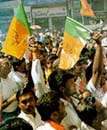'People who wield power in India today could not have dreamt of such power thirty years ago'
You seen enamoured of Indian diversity, but many would argue
that our diversity is a source of division rather than strength?
 The point about Indian diversity is that you can be many
things and one thing. You can be a good Muslim, a good Keralite
and a good Indian all at once. Our founding fathers wrote a
Constitution for a dream; we have given passports to our ideals.
Where Freudians note the distinctions that arise out of "the
narcissism of minor differences", in India we celebrate the
commonality of major differences.
The point about Indian diversity is that you can be many
things and one thing. You can be a good Muslim, a good Keralite
and a good Indian all at once. Our founding fathers wrote a
Constitution for a dream; we have given passports to our ideals.
Where Freudians note the distinctions that arise out of "the
narcissism of minor differences", in India we celebrate the
commonality of major differences.
If America is a melting-pot,
then to me India is a thali, a selection of sumptuous dishes in
different bowls. Each tastes different, and does not necessarily
mix with the next, but they belong together on the same plate,
and they complement each other in making the meal a satisfying
repast. For me, what is precious about India is the idea that a
nation may endure differences of caste, creed, colour, culture,
cuisine, costume and custom, and still rally around a democratic
consensus. That consensus is around the simple principle that in
a democracy you don't really need to agree -- except on the ground
rules of how you will disagree.
The reason India has survived
all the stresses and strains that have beset it for fifty years,
and that led so many to predict its imminent disintegration, is
that it maintained consensus on how to manage without consensus.
You seem to have strong views on secularism, and in
particular on Hinduism versus Hindutva?
My views on the topic are not easy to summarise, in that I
approach the debate as a believing Hindu, but one who sees the
fundamentals of the faith quite differently from the so-called
"fundamentalists". In particular, I believe in the eclectic,
inclusive, tolerant Hinduism that Vivekananda preached -- which is
open to ideas of all sorts. On the one hand, I see the votaries
of Hindutva articulating a narrow, exclusive, doctrinaire
Hinduism which I find hard to reconcile with Vivekananda's
Hinduism. On the other hand, I cannot accept those secularists
who would make the state hostage to the most obscurantist among
the minorities.
The Hindu-Muslim riots of 1992-93 are less than five years old.
Yet recent trends suggest that economic liberalisation and
political democracy will make sectarianism and bigotry unviable.
Market forces militate against fundamentalisms; the rupee,
though not quite yet as almighty as the dollar, does not
recognise the faith of the man making or spending it.
Many a Hindu businessman depends for his profits on a Muslim worker, or
tailor, or weaver, who in turn depends on the Hindu for his
employment; they thus develop a vested interest in keeping each
other safe. A riot against the Muslim artisans of the Hindu
sacred city of Varanasi would deprive Hindus of the traditional
masks and paraphernalia required for the annual Ramlila; without
these industrious and experienced Muslim hands, Benares Hindus
could not celebrate their own religious epic the Ramayana.
In any case, Hinduism is a civilisation, not a dogma. Hindu
resurgence is the mirror image of the Muslim communalism that
partitioned the country in 1947; its rhetoric echoes the bigotry
that India was constructed to reject. Its triumph would mark the
end of India, and that, I am convinced, Indians will not let
happen.
You use the term 'muddling through', not unaffectionately, to
describe the Indian enterprise.
That is not an inappropriate term in the Indian context.
India has never come across as a nation with a single-minded,
dedicated purpose. It is so large and diffuse and diverse. It is
sometimes in harmony and sometimes in disharmony.
It takes three steps forward, and two steps back. Policies are
implemented only after much debate, argument, side-tracking. But
in the end the country comes out all right. That is what I mean
by "muddling through"..
Don't you think there is a greater feeling of India as a
nation now? In India, I see bumper-stickers saying "I
love India"?
Very much so, but there is a paradox. There is a great deal
of nationalist sentiment. But there is also much more
consciousness of casteism and regionalism. Especially casteism.
In the past, it was not respectable for politicians to appeal to
caste or religion overtly, but today explicitly sectarian
campaigns are conducted.
But in parallel, there has been a
genuine drawing together, and a pan-Indian culture. For example,
North Indian clerks going to a dhaba after work can and eat
masala dosas as easily as they would chhole bature. While
politicians focus on what divides us, there seems to be less
dividing us than there used to be, in a cultural sense.
But isn't casteism in some ways a symptom of the coming of
age of the hitherto depressed groups, as you point out in your
chapter on the scheduled caste youngster who makes good?
 You could in one sense say this is a vindication of political
democracy. With freedom, you can begin to deliver bread to those
at the back of the queue.
You could in one sense say this is a vindication of political
democracy. With freedom, you can begin to deliver bread to those
at the back of the queue.
After Independence, the underprivileged have been, if not
exactly privileged, certainly been looked upon more kindly by
the state. Democracy has worked -- the extent to which there is
awareness of caste is an indication of this -- people have been
forced into awareness, partly because of the thorough-going
reform instituted by affirmative action laws in India, which
have been more successful than the much narrower reforms
attempted in the US. People who wield power in India today
could not have dreamt of such power thirty years ago. That is an
example of how democracy has transformed the country.
On the other hand, caste has also become a special interest
group, born of economic necessity, perhaps?
It is true, of course, that people are mobilising for their
share of an economic pie which hasn't grown much in the first
four and a half decades after Independence; with slow economic
growth and rapid population growth, there is less and less to
distribute. I have always had my doubts about the prevailing
Fabian socialist orthodoxy. As a student in Delhi, I must have
been the only Swatantra Party supporter around. They
seemed to have economic ideas that made more sense than the
government's faith in State control of the "commanding heights"
of the economy.
|

